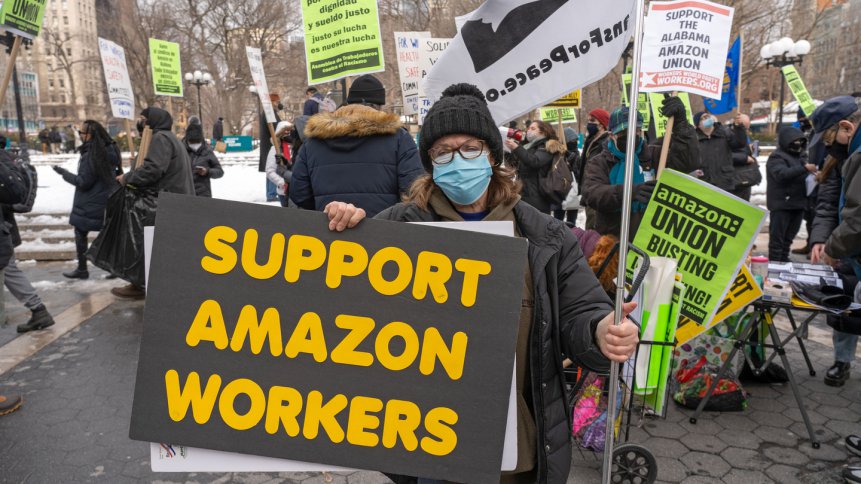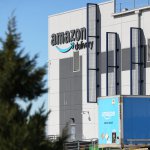Amazon Loses First Round of Labor Union Battle

In April, 2022, workers at a Staten Island Amazon warehouse, JFK8, voted to form the company’s first US union in its 27-year history. With over 5,000 votes cast in total, the union won its vote by 523 ballots, a clear 10% of those cast. Amazon wasted no time disappointing generations of users by behaving like ‘The Man’ and seeking to have the vote overturned, underlining the principle previously established by the likes of Google and Apple, that for all that big tech firms like to think of themselves as planetary beneficiaries, they are not in fact any friend to the working men and women of America. In fact, they’re very much more in the mold of traditional capitalist enterprises than their carefully orchestrated “groovy” images would have their users believe.
Within 7 days of the original union victory, Amazon had filed its objections with the National Labor Relations Board – 25 objections, in total – including the notion that the independent federal agency’s regional office (which oversaw the election at JFK8) had “unfairly and inappropriately facilitated the [Amazon Labor Union’s] victory.”
It also claimed that the agency had used an “artificially reduced number” of workers in the voting unit to determine that the ALU had attracted enough support to hold an election, and that it delayed investigating what it described as “frivolous” unfair labor practice charges it says the union “exploited” to sway the vote its own way.
Arguments Rejected
It also, in a Trumpian touch, alleged that the agency had not properly staffed the polls during the election, resulting in “chaos and hours-long lines to vote on the first polling day, discouraging other employees from voting.”
Now, the National Labor Relations Board officer who worked through Amazon’s objections has returned a “verdict” on them. Amazon’s objections have been thoroughly rejected, and the original vote has been upheld.
The officer, who naturally works for a different NRLB office to the one accused of sloppy conduct by Amazon, said the company had failed to prove that either the union, the NLRB, or any third party had “engaged in objectionable conduct affecting the result of the election.”
The Second Appeal
It should not by now come as any surprise that Amazon has immediately said it will appeal the finding.
Amazon spokesperson Kelly Nantel said the company strongly disagreed with the conclusion, and reiterated its claim that both the NLRB and the ALU improperly influenced the outcome of the election. The company also accused the union supporters of intimidating employees and “threatening violence against its detractors.”
Amazon now has until September 16th to file its further objections to the decision of the officer, which if unchallenged would serve as a recommendation to the NLRB. At this point, the NLRB is under no obligation to follow through on the officer’s recommendation. If Amazon’s further objections – which at present look to be simple re-iterations of the arguments that have so far failed it – do not convince the NLRB to set aside its officer’s recommendation, the company will be obliged to begin negotiations to set up the first union in its history.
If they happen, having been fought at every possible stage, it’s fair to say those negotiations will probably be challenging for the fledgling union.
Meanwhile, a subsequent vote on unionization in an Alabama Amazon warehouse is being contested by both Amazon and the union. A previous vote in Alabama had to be set aside because labor officials found Amazon had unfairly influenced the original election. Subsequently, the agency is also investigating accusations of unfair labor practices by the Retail, Wholesale and Department Store Union that is behind the unionization attempt in Alabama.
The fight against unionization at Amazon is only surprising because the tech industry has always portrayed itself as a different class of billionaire-led business. Amazon, Apple, Google, Microsoft and more grew up as comparative rebels against the standard business model of bosses versus workers, but as the industry has matured and grown to essentially run the way the world works in the 21st century, tech companies have hardened their stance and ‘become The Man’ when it comes to giving their workers the right to negotiate their pay and conditions.
The hardening has taken place against the background of a corporate self-delusion that tech companies already offer industry-leading packages, so there is no need for workers to unionize. That’s a dangerously paternalistic approach, which risks undoing all the work of the tech giants’ corporate PR.
A Rotten Apple?
While Amazon fulminates against the NLRB officer in the JFK8 case, Apple too is facing a domino effect among its workforce, as more and more stores and facilities call for the formation of unions. The same week Amazon was handed the NLRB officer’s decision in New York, Apple store workers in Oklahoma City filed for a union election – over 70% of staff at the store voted in favor of the election, more than double the 30% needed to call the election.
An Apple store in Atlanta was due to hold a union election in June, but called it off because the Communication Workers of America said the election would be unfair because of Apple’s “repeated violations of the National Labor Relations Act.”
Apple’s vice president of people and retail, Deirdre O’Brien, said she worried about what it would mean to “put another organization in the middle of our relationship, an organization that does not have a deep understanding of Apple or our business, and one that I do not believe shares our commitment to you [Apple staff].”
The ongoing resistance of the tech giants to the principle of unionization – even in the face of a challenging economic outlook – risks the goodwill not only of tech industry staff, but also potentially the custom of users nationwide (and worldwide), as it reveals the refusal of such giants to acknowledge the autonomy of their staff, and speaks of an unending contempt for organized labor.










